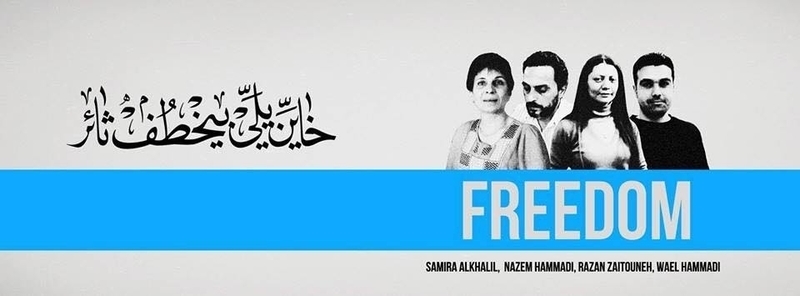On December 9, 2013, the Syrian human rights lawyer and founder of the Violations Documentation Centre (VDC), Razan Zaitouneh, was kidnapped in the western city of Douma with three other VDC activists: Samira al-Khalil, Wael Hamada and Nazim al-Hamadi. One year later, the whereabouts and fate of Zaitouneh and her colleagues remain an unresolved mystery. Their case threatens to become the umpteenth forgotten abduction of Syrian activists.
Enforced disappearance has become an alarming issue in Syria, with the whereabouts and fates of thousands of Syrians a mystery since the outbreak of the popular uprisings in March 2011. While some have been detained by state security services or local police in towns and villages loyal to Bashar al-Assad's regime, others are being held by fighters with the Islamic State of Iraq and Syria (ISIS). The summary execution of detainees by opposing forces remains a distinct possibility.
"Waynun" (colloquial Syrian Arabic for "Where are they?") is a new campaign launched by young Syrian opposition members to highlight the plight of the forcibly displaced, including both those in the Syrian regime's jails and those detained by ISIS.
Yara, a member of the youth activist group, said that in addition to raising awareness, the campaign aims to demand transparency from the captors.
"The purpose of our initiative was to learn about the fate of the thousands of missing Syrians who are languishing in the Syrian regime's dungeons, and to see them return to their families," Yara, who did not provide a last name, told Al Jazeera.
Citing the values of free expression and belief, the campaign has called for the release of all political prisoners and prisoners of conscience.
So far, much of the group's efforts have focused on generating publicity. Yara said: "We have already designed a logo for the group, and have begun collecting photos of all of the disappeared persons that we have managed to find in order to distribute these throughout the country. Some of our volunteers have designed a graffiti stencil of the campaign logo, and this has been tagged in a number of areas throughout Aleppo and Idleb."
Thanks to the campaign's public relations efforts, the logo has started gaining publicity in several European capitals, where some recent news reports have aired about the missing Syrians.
Samar, a human rights activist and a fellow member of Waynun, told Al Jazeera that the main challenge faced by the campaign so far has been the silence of the families involved.
In many cases, Samar said, the families of detainees declined to even announce their family members' disappearances: "The families fear that talking will lead to the further marginalisation of the missing people's cases. We have raised the families' awareness of the importance of voicing their demand for the release of their missing family members, but some have chosen to remain silent out of a hope that their disappeared relatives would be released, or at least that their fate will be confirmed."
So far, Waynun has met with massive public support. Regime advocates have set up a parallel organisation demanding to learn the fate of more than 250 Syrian army soldiers who went missing after ISIS seized the Tabaqa military airport.


